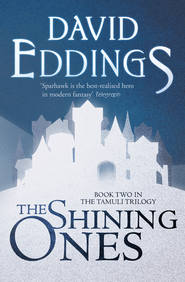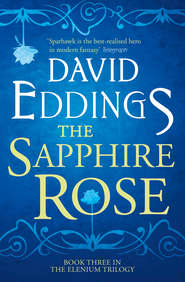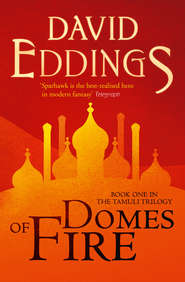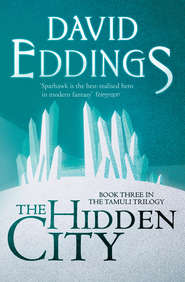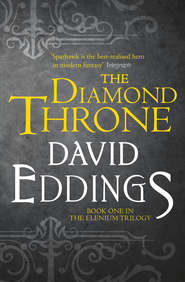По всем вопросам обращайтесь на: info@litportal.ru
(©) 2003-2025.
✖
Belgarath the Sorcerer and Polgara the Sorceress: 2-Book Collection
Автор
Год написания книги
2019
Настройки чтения
Размер шрифта
Высота строк
Поля
‘We could do it ourselves,’ Belkira suggested. ‘As I recall, you translocated a half-acre or so of rocks when you helped Belgarath build his tower.’
‘Those were loose rocks, brother,’ Beldin told him sourly, ‘and it was all I could do to walk the next day. Belsambar says that the Angaraks stick their walls together with mortar. We’d have to take them apart stone by stone.’
‘And they’d be rebuilding them as fast we tore them down,’ Belmakor added. He looked thoughtfully up at the ceiling of Belsambar’s tower where we’d gathered. Then, naturally, considering the fact that it was Belmakor, he reverted to logic. ‘First off, Beldin’s right. We can’t just swarm their cities under. The casualties would be unacceptable,’ He looked around at the rest of us. ‘Do we agree on that?’
We all nodded.
‘Splendid,’ he said dryly. ‘Secondly, if we try to take down their walls with the Will and the Word, we’ll exhaust ourselves and we won’t really accomplish all that much.’
‘What does that leave us?’ Belzedar asked him crossly. I’d picked up a few hints from the others that Belzedar and Belmakor had argued extensively when they’d reached the lands of the Tolnedrans. Belzedar, as second disciple, had assumed that he was in charge. Belmakor, borrowing my authority, had contested that, and Beldin had backed him. Belzedar was mightily offended, I guess, and he seemed to be looking for some way to get back at Belmakor for what he felt to be his humiliation. ‘We can’t strike at Torak directly, you realize,’ he went on. ‘The only way we can hurt him enough to force him to give back the Orb is to hurt his people, and we won’t be able to hurt them if they’re hiding behind those walls.’
‘The situation would seem to call for something mechanical then, wouldn’t you say, old chap?’ Belmakor responded in his most urbanely off-hand tone.
‘Mechanical?’ Belzedar looked baffled.
‘Something that doesn’t bleed, old boy. Something that can reach out from beyond the range of the Angarak spears and knock down those walls.’
‘There isn’t any such thing,’ Belzedar scoffed.
‘Not yet, old chap, not yet, but I rather think Beldin and I can come up with something that’ll turn the trick.’
I’d like to set the record straight at this point. All manner of people have tried to take credit for the invention of siege-engines. The Alorns claim it; the Arends claim it; and the Malloreans certainly claim it; but let’s give credit where credit is due. It was my brothers, Belmakor and Beldin, who built the first ones.
This is not to say that all of their machines worked the way they were supposed to. Their first catapult flew all to pieces the first time they tried to shoot it, and their mobile battering-ram was an absolute disaster, since they couldn’t come up with a way to steer it. It tended to wander away from its intended target and mindlessly bang on unoffending trees – but I digress.
It was at that point in the discussion that our mystical brother, Belsambar, suggested something so horrible that we were all taken aback. ‘Belmakor,’ he said in that self-effacing tone of his, ‘do you think you can really devise something that would throw things long distances?’
‘Of course, old boy,’ Belmakor replied confidently.
‘Why should we throw things at the walls, then? We have no quarrel with the walls. Our quarrel’s with Torak. I’m an Angarak, and I know the mind of Torak better than any of the rest of you. He encourages his Grolims to sacrifice people because it’s a sign that they love him more than they love their fellow man. The more the victim on the altar suffers, the greater he views it as a demonstration of love for him. It’s the specific, individualized pain of the sacrificial victim that satisfies him. We can hurt him best if we make the pain general.’
‘Exactly what did you have in mind, brother?’ Belmakor asked him with a puzzled look.
‘Fire,’ Belsambar told him with dreadful simplicity. ‘Pitch burns, and so does naphtha. Why should we waste our time and the lives of our soldiers attacking walls? Use your excellent engines to loft liquid fire over the walls and into the cities. Trapped by their own walls, the Angaraks will be burned alive, and there won’t be any need for us even to enter their cities, will there?’
‘Belsambar!’ Beltira gasped. ‘That’s horrible!’
‘Yes,’ Belsambar admitted, ‘but as I said, I know the mind of Torak. He fears fire. The Gods can see the future, and Torak sees fire in his. Nothing we could do would cause him more pain. And isn’t that our purpose?’
In the light of what happened later, Belsambar was totally correct, though how he knew is beyond explanation. Torak did fear fire – and with very good reason.
Although Belsambar’s suggestion was eminently practical, we all tried to avoid it. Belmakor and Beldin went into an absolute frenzy of creativity, and the twins no less so. They experimented with weather. They spun hurricanes and tornadoes out of clear blue skies, hoping thereby to blow down the Angarak cities and towns. I concentrated my efforts on assorted illusions. I’d fill the streets of the walled cities of Angarak with unimaginable horrors. I’d drive them out from behind their walls before their mystical kinsman could roast them alive.
Belzedar worked at least as hard as the rest of us. He seemed obsessed with the Orb, and his labor on means to reclaim it was filled with a kind of desperate frenzy. Through it all, Belsambar sat, patiently waiting. He seemed to know that once the fighting started, we’d return to his hideous solution.
In addition to our own labors, we frequently traveled to the lands of our allies to see what progress they were making. Always before, the various cultures had been rather loose-knit, with no single individual ruling any of the five proto-nations. The war with Torak changed all that. Military organization is of necessity pyramidal, and the concept of one leader commanding an entire race carried over into the various societies after the war was over. In a way, I suppose you could give Torak credit – or blame – for the idea of kings.
I suppose that I’m the one who was ultimately responsible for the royal house of the Alorns. By general consensus, my brothers and I had continued to serve as liaisons between the various races, and we more or less automatically assumed responsibility for the people of whichever God we had personally invited to that conference in the Vale after Torak stole the Orb. I think that my entire life has been shaped by the fact that I had the misfortune to be saddled with the Alorns.
Our preparations for war took several years. The assorted histories of the period tend to gloss over that fact. There were border clashes with the Angaraks, of course, but no really significant battles. Finally the Gods decided that their people were ready – if anybody in those days could actually be called ready for war. The war against the Angaraks was like no other war in human history in that our deployment involved a general migration of the various races. The Gods were so intimately involved with their people in those days that the notion of leaving the women and children and old people behind while the men went off to fight simply didn’t occur to them.
Mara and Issa took their Marags and Nyissans and started their trek southeasterly into the lands of the Dals, even as the Tolnedrans and Arends began their swing toward the west. The Alorns, however, didn’t move. It was perhaps the only time I ever saw my Master truly vexed about anything. He instructed me with uncharacteristic bluntness to go north and find out what was holding them up.
So I went north again, and, as always by now, I didn’t go alone. I don’t know that we’d ever actually discussed it, but the young she-wolf had sort of expropriated me. Since she was along, I once again chose the shape of a wolf for the journey. She approved of that, I suppose. She was never totally satisfied with my real form, and she seemed much happier with me when I had four feet and a tail.
We found out what was holding up the Alorns almost before we reached the lands of the Bear-God. Would you believe that they were already fighting – with each other?
Alorn society – such as it was in those days – was clannish, and the bickering was over which clan-chief was going to take command of the entire army. The other Gods had encountered similar problems and had simply overruled the urges toward supremacy of the various factions and selected one leader to run things. Belar, however, wouldn’t do that. ‘I’m sure you can see my position, Belgarath,’ he said to me, when I finally found him. He said it just a little defensively, I thought.
I took a very deep breath, suppressing my urge to scream at him. ‘No, my Lord,’ I said in as mild a tone as I could manage. ‘Actually, I don’t.’
‘If I select one clan-chief over the others, it might be construed as favoritism, don’t you see? They’re simply going to have to settle it for themselves.’
‘The other races are already on the march, my Lord,’ I reminded him as patiently as I could.
‘We’ll be along, Belgarath,’ he assured me, ‘eventually.’
By then I knew Alorns well enough to realize that Belar’s ‘eventually’ would quite probably stretch out for several centuries.
The she-wolf at my side dropped to her haunches with her tongue lolling out. Her laughter didn’t improve my temper very much, I’ll confess.
‘Would you be open to a suggestion, my Lord?’ I asked the Bear-God in a civil tone.
‘Why, certainly, Belgarath,’ he replied. ‘To be honest with you, I’ve been racking my brains searching for a solution to this problem. I’d hate to disappoint my brothers, and I really don’t want to miss the war entirely.’
‘It wouldn’t be the same without you, my Lord,’ I assured him. ‘Now, as for your problem. Why don’t you just call all your clan-chiefs together and have them draw lots to decide which of them will be the leader of the Alorns?’
‘You mean just leave it all in the hands of pure chance?’
‘It is a solution, my Lord, and if you and I both promise not to tamper in any way, your clan-chiefs won’t have any cause for complaint, will they? They’ll all have an equal chance at the position, and if you order them to abide by the way the lot falls, it should put an end to all this …’ I choked back the word ‘foolishness.’
‘My people do like to gamble,’ he conceded. ‘Did you know that we invented dice?’
‘No,’ I said blandly. ‘I didn’t know that.’ To my own certain knowledge, every other race made exactly the same claim. ‘Why don’t we summon your clan-chiefs, my Lord? You can explain the contest – and the rules – to them, and we can get on with it. We certainly wouldn’t want to keep Torak waiting, would we? He’ll miss you terribly if you’re not there when the fighting starts.’
He grinned at me. As I’ve said before, Belar has his faults, but he was a likeable young God. ‘Oh, by the way, my Lord,’ I added, trying to make it sound like an afterthought, ‘if it’s all right with you, I’ll march south with your people.’ Somebody had to keep an eye on the Alorns.
‘Certainly, Belgarath,’ he replied. ‘Glad to have you.’
And so the Alorn clan-chiefs drew lots, and regardless of what Polgara may think, I did not tamper with the outcome. In my view, one clan-chief was almost the same as any other, and I really didn’t care who won – just as long as somebody did. As luck had it, the clan-chief who won was Chaggat, the ultimate great-grandfather of Cherek Bear-shoulders, the greatest king the Alorns have ever had. Isn’t it odd how those things turn out? I’ve since discovered that while I didn’t tamper and neither did Belar, something else did. The talkative friend Garion carries around in his head took a hand in the game. He was the one who selected Cherek’s ancestor to be the first King of the Alorns. But I’m getting ahead of myself – or had you noticed that?
Once the question of leadership had been settled, the Alorns started moving in a surprisingly short period of time – although it’s not all that surprising, if you stop and think about it. The Alorns of that era were semi-nomadic in the first place, so they were always ready to move on – largely, I think, because of their deep-seated aversion to orderliness. Prehistoric Alorns kept messy camps, and they found the idea of moving on to be far more appealing than the prospect of tidying up.
Anyway, we marched south, passing through the now-deserted lands of the Arends and the Tolnedrans. It was about midsummer when we reached the country formerly occupied by the Nyissans. We began to exercise a certain amount of caution at that point. We were getting fairly close to the northern frontier of the Angaraks, and it wasn’t very long before we began to encounter small, roving bands of the Children of Torak.
Alorns have their faults – lots of them – but they are good in a fight. It was there on the Angarak border that I first saw an Alorn berserker. He was a huge fellow with a bright red beard, as I recall. I’ve always meant to find out if he might have been a distant ancestor of Barak, Earl of Trellheim. He looked a lot like Barak, so there probably was some connection. At any rate, he outran his fellows and fell single-handedly on a group of about a dozen Angaraks. I considered the odds against him and started to look around for a suitable grave-site. As it turned out, however, it was the Angaraks who needed burying after he finished with them. Shrieking with maniacal laughter and actually frothing at the mouth, he annihilated the whole group. He even chased down and butchered the two or three who tried to run away. The children of the Bear-God, of course, stood there and cheered.
Alorns!







